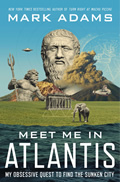
When I tell people I've spent the last three years working on a book about Atlantis, they usually have two questions. The first almost always goes unspoken: Are you nuts? (I don't think so, but perhaps I'd be the last to know.) The follow-up question — which almost always does get asked — is where I got the idea to write about Atlantis.
If an author is lucky, he or she will be chugging along working on one book when some detail pops out that is hard to shake off. In my case, I was researching the major events of 1911 while working on the book that became Turn Right at Machu Picchu — 1911 is the year the Peruvian citadel was rediscovered — when I came across a rather unusual headline in the New York Times: GERMAN FINDS ATLANTIS IN AFRICA. Not exactly the sort of thing one expects to see in the paper of record, but when I read the article, it turned out that a German explorer had indeed made a discovery that he believed proved that the famous sunken city had once existed in Africa; something about a statue of Poseidon. In other words, not only did people believe Atlantis was real, they had actively searched for it at one time.
Not long afterward, a friend at a women's magazine asked me to write a story about the 10 greatest philosophers of all time and how their ideas applied to the lives of America's working mothers. Or something like that. I called around to several philosophy professors to compile my rankings, and every single one of them told me, "Plato is number one; Aristotle is number two." If you've ever tried to read Plato without guidance, you know he can be a little difficult to wrap your head around. I cheated a little and consulted a very basic Philosophy 101 survey of his main ideas, in which the author stated that the most influential thing Plato ever wrote — even more than The Republic — was the story of Atlantis. Wait, what? So now in addition to a long-ago search for the lost city, I've got the detail that a story usually associated with Bigfoot and UFOs actually came from Western history's greatest thinker.
Around the same time, I was working at the late, lamented National Geographic Adventure magazine on the day Google Earth was introduced. Suddenly, all these emails started pouring in to the office account saying the same thing: "I just found Atlantis on Google Earth!" What had happened was that a ship's sonar had left a grid pattern in the Atlantic Ocean, which Google erased by day's end. (This disappearance led to a few conspiracy theories — there's a lot of cross-pollination between that crowd and Atlantis folks.) What I took away from the experience, though, was that a lot of people were still looking for Atlantis. I started to search around for the most likely location theories, and once I began communicating with the fascinating people who came up with these ideas, I knew I had a book. Eight countries on three continents later, here it is.